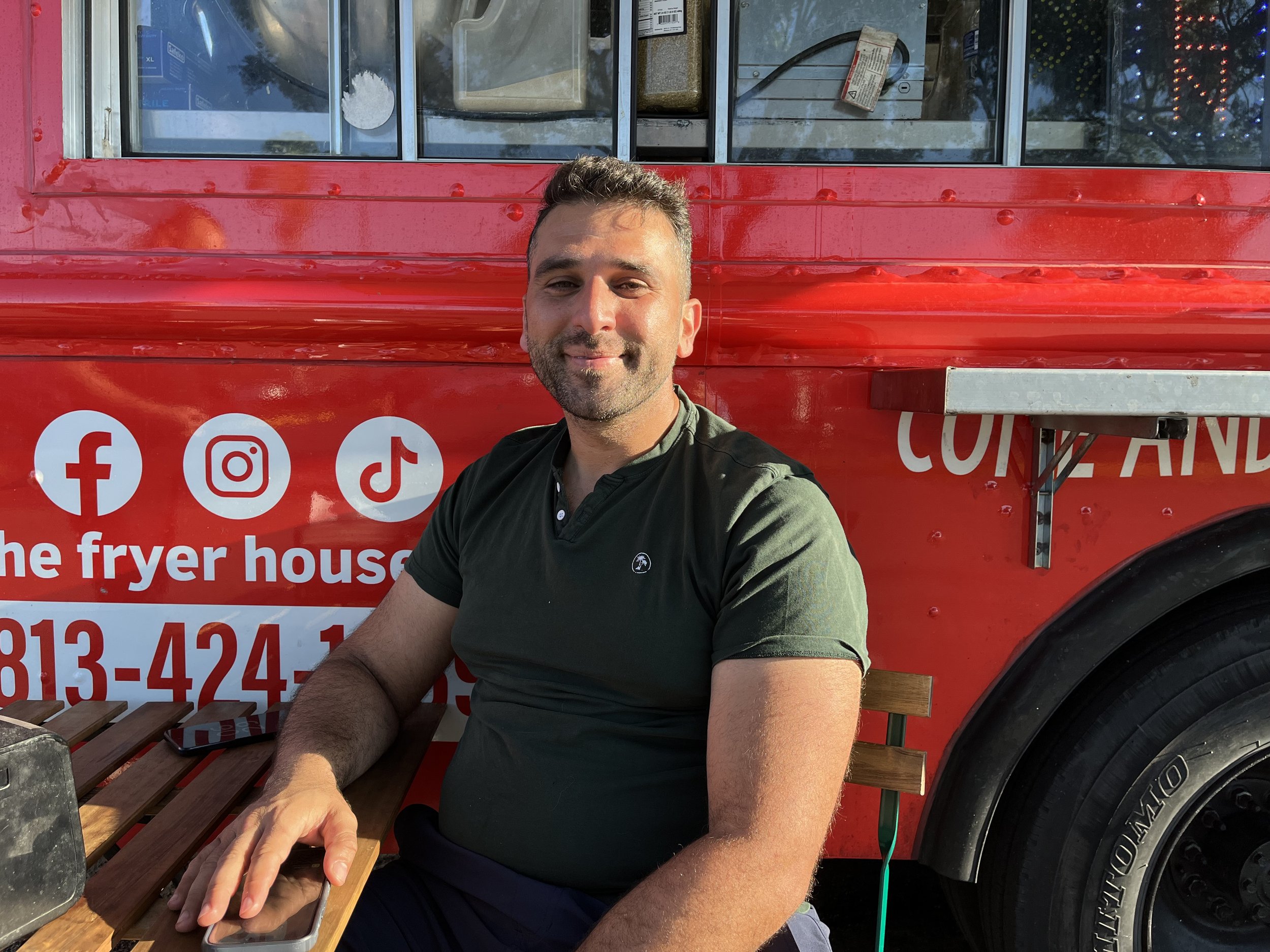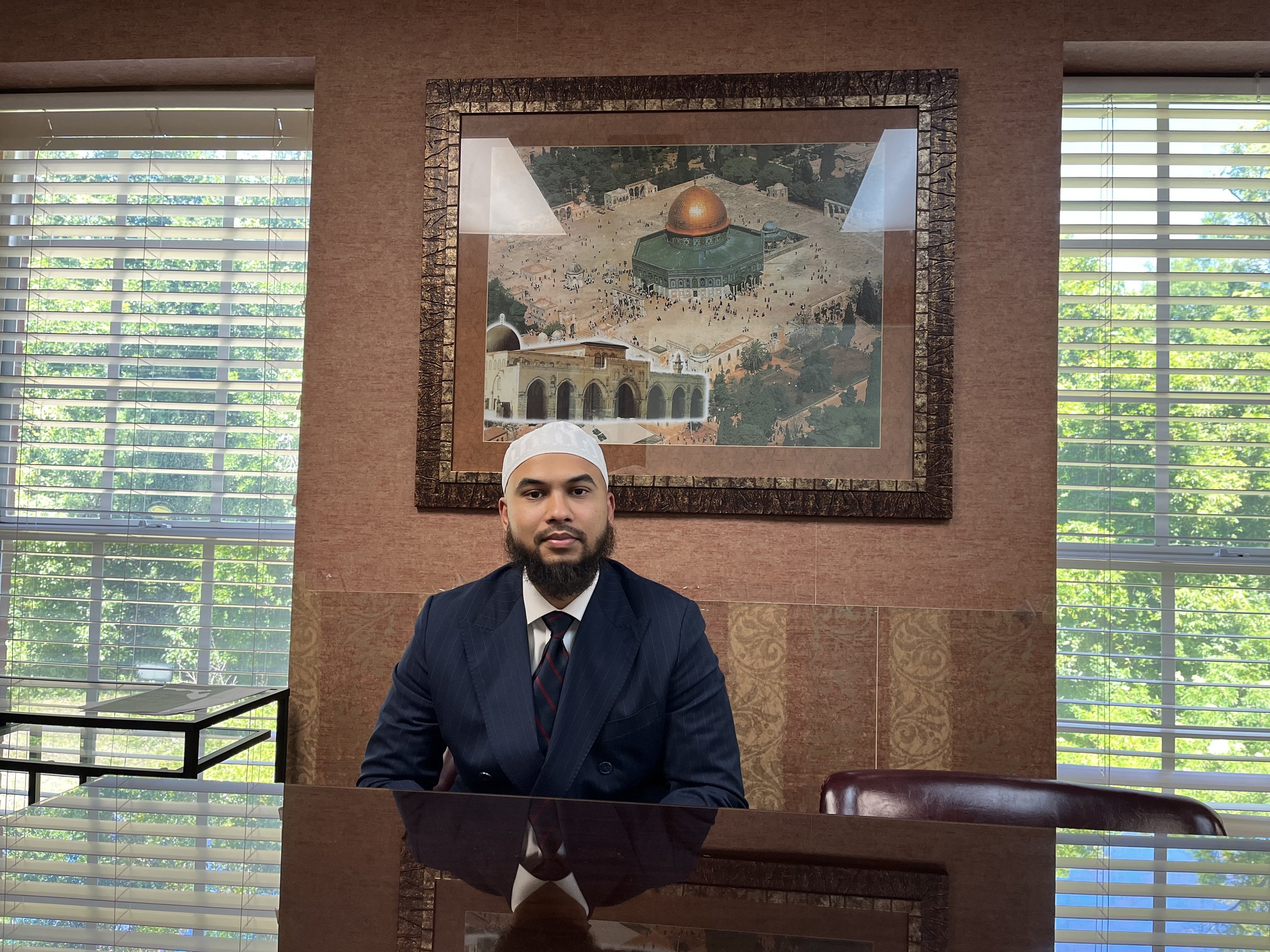While the city’s Islamic infrastructure is dynamic, the community’s mix of progressive values and social conservatism makes it an outlier in a polarized ideological landscape.
Ashraf “Ash” Ayyash, owner and operator of The Fryer House foodtruck in Temple Terrace, Fla. (PHOTO: Ken Chitwood)
“You’ve got to try The Fryer House,” Aaysha Kapila told me via the Tampa Halal Food Facebook group. “It’s new on the scene, but it’s amazing.” The “scene” in question? Tampa’s market for halal food. And The Fryer House, a food truck that opened in December 2023, is one of the newest on it, offering a fusion of Arab, Asian and American Southern fried chicken — from hot chicken sandwiches to fiery golden tenders to chicken and waffles.
Blending Palestinian spices with Japanese styles and Latin American peppers, the food truck’s owner, Ashraf “Ash” Ayyash, says his brand of “halal hot chicken” has proved a hit. While his customers come from a cross-section of Tampa society, many are Arabs and South Asian Muslims looking for a spicy, sumptuous, halal option for lunch or dinner. During Ramadan, Ayyash said, he cooked thousands of pounds of chicken. At a series of major local events during the month of fasting — Ramadan Suhoor Nights — he averaged 300 pounds per night.
Sitting underneath Ayyash’s menu with its hot, very hot and “pepper x” levels of spiciness, a slim, 30-something Palestinian American named Zyad is snacking on some of Ayyash’s specially seasoned french fries. This, he says, is one of his favorite options in Temple Terrace, a city on the northeast side of Tampa Bay and epicenter of its robust halal food scene. “There’s a Yemeni place down the road, several shawarma options, an Arab grocery store, a Turkish grocery store, bakeries, clothing stores, restaurants, food trucks. The list goes on,” he told New Lines.
“Tampa,” Zyad said, “is like the new Dearborn,” referring to Dearborn, Michigan, the first Arab-majority city in the U.S. and home to the largest mosque in North America.
Though there are no official statistics, estimates of Tampa’s Muslim community range between 5,000 or 6,000 in the Temple Terrace-New Tampa area alone, to upward of 36,000 or as high as 100,000 in the greater Tampa Bay area, which includes St. Petersburg and Clearwater.
Community statistics show an estimated 500,000 Muslims in Florida and over 150 mosques and Islamic centers across the state, from the Keys in the south to Pensacola on the panhandle. And they cut the cross section of Muslim-American society: Almost one-third were born in the U.S., with the remaining 69% coming from places like Pakistan and India, Egypt and Palestine, Guyana and Puerto Rico. The Tampa Bay area is home to tens of thousands of Muslims from over 80 different countries.
Especially around Busch Boulevard and 56th Street, not far from the Busch Gardens amusement park and the main campus of the University of South Florida (USF), Tampa’s Islamic infrastructure is dense, a testament to its rarely recognized, but consistently growing, Muslim community. Not only are numerous mosques and several of the nation’s premier Islamic schools in and around Temple Terrace, but there are also law offices with signs in Arabic and Urdu, numerous halal restaurants, Middle Eastern barber shops, Ramadan decor hanging in shop windows and a large halal slaughterhouse named Musa’s.
Abdullah Jaber at CAIR’s offices in Temple Terrace, Fla. (PHOTO: Ken Chitwood)
“I would estimate around 70% of the businesses in the Temple Terrace area are Muslim-owned,” said Imam Abdullah Jaber, executive director of CAIR Florida, the Sunshine State’s chapter of the Council on American-Islamic Relations, a civil liberties organization whose offices are also in Temple Terrace. “There are Muslims heading the Chamber of Commerce, professors at local universities, dentists, physicians, you name it.”
They are also shaping local, state and national elections with the growing political power that comes with such a presence. But that influence is far from monolithic: The Muslim community’s shifting political crosscurrents and fault lines mean it doesn’t align neatly with either camp in the country’s increasingly polarized landscape. “I think you can be socially conservative and yet be an advocate for social and racial justice,” Jaber told New Lines.
“Maybe that’s impossible with America’s current politics, but I think Tampa is leading the way here. It’s a model for American Muslim life.”


